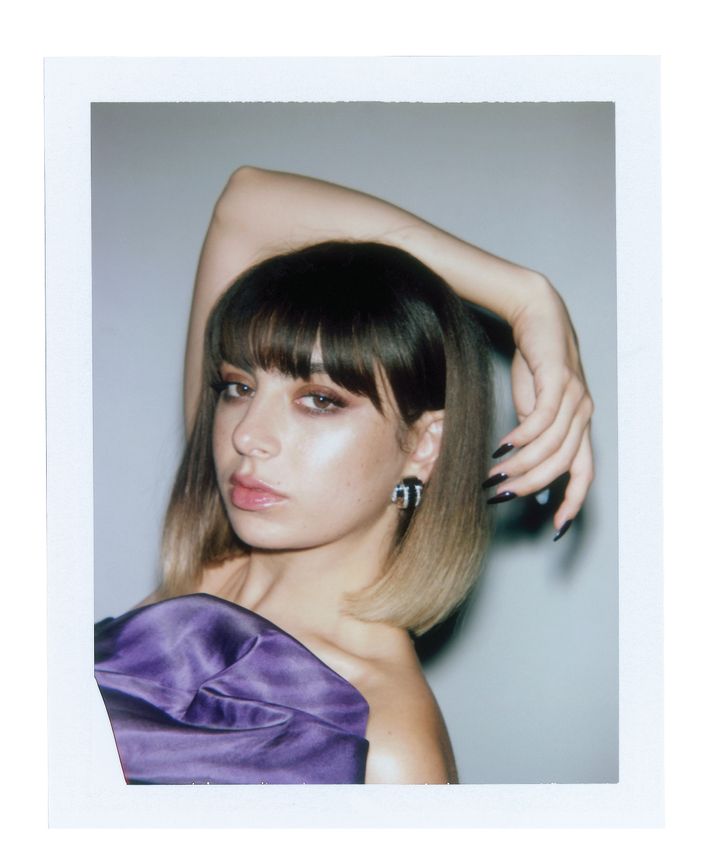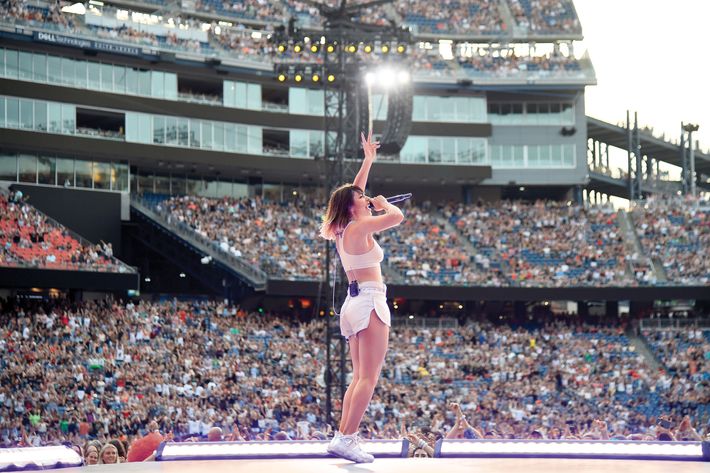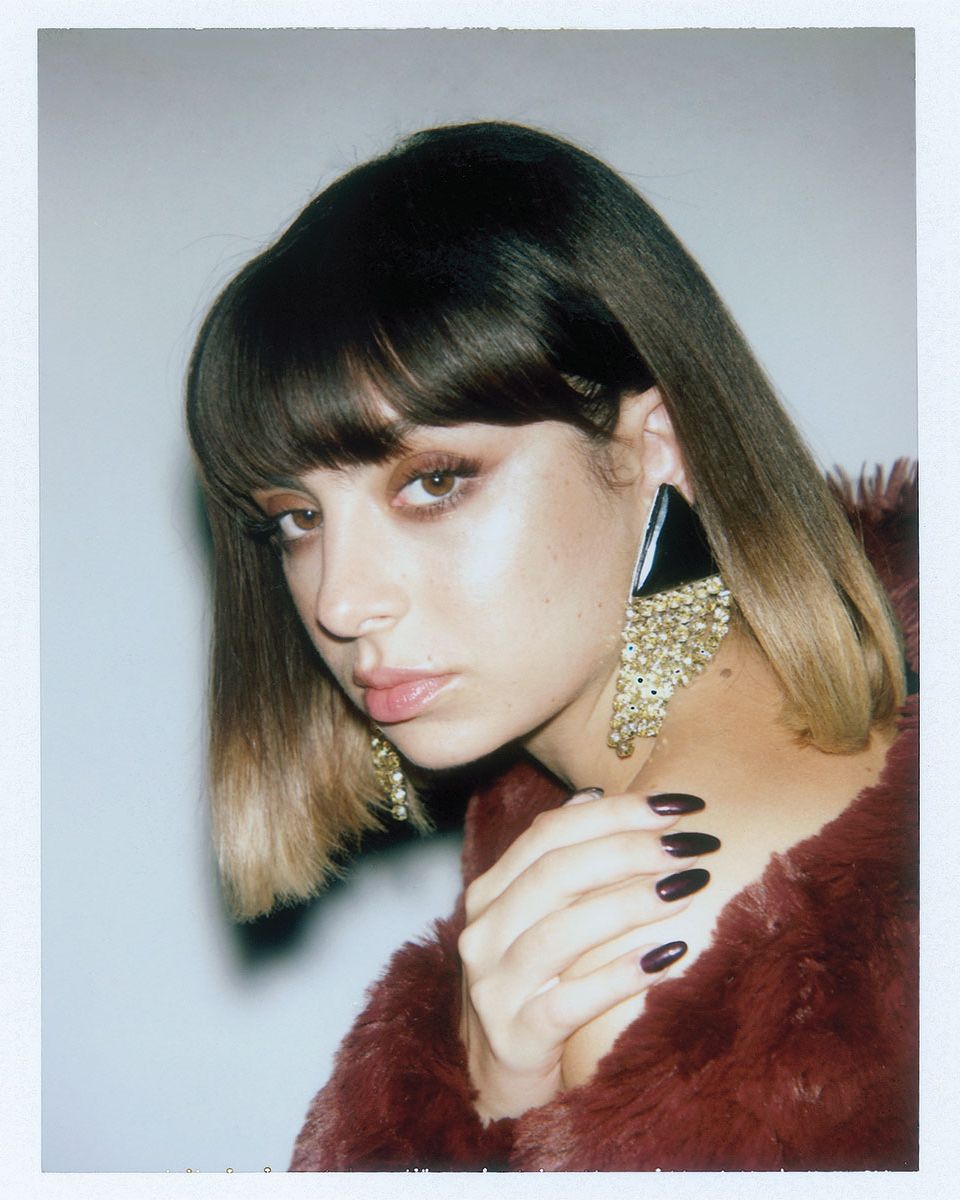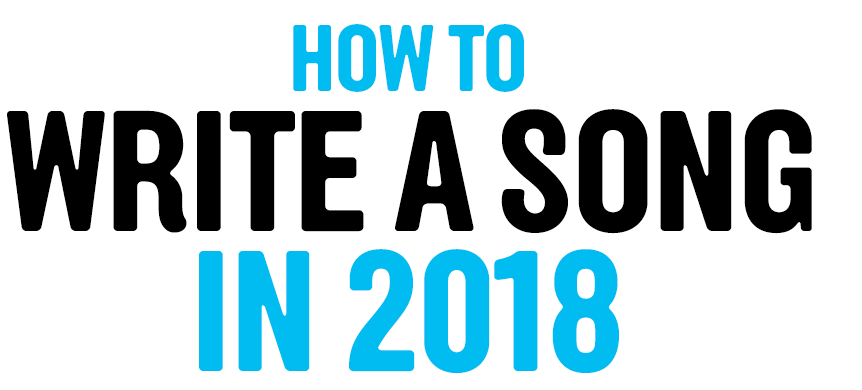Taylor Swift has entered Chicago. Pedicabs swirl around Millennium Park blasting her hits as thousands of midwestern pop-music fans make their pilgrimage to Soldier Field, where they will be treated to glittery flights through the air, towering inflatable snakes, and an exploding mansion. But before they can see all that, theyÔÇÖre going to see Charli XCX. Well, some of them are. When Charli takes the stage at 7:10 p.m., the arena is about a third full. If this were one of her own shows, she would have pregamed, but not on the Swift tour. ÔÇ£It feels weird to get really wasted and go onstage in front of a load of 5-year-olds and their parents,ÔÇØ she says beforehand. ÔÇ£ItÔÇÖs a bit like hiring a drunk clown.ÔÇØ
Tonight, Charli does seven songs. Three of them are her big hits, though only one of them ÔÇö her opener, 2014ÔÇÖs ÔÇ£Boom ClapÔÇØ ÔÇö is technically a Charli XCX song. Her second, 2012ÔÇÖs ÔÇ£I Love It,ÔÇØ she gave away to the Swedish duo Icona Pop, but that hardly matters when everyone in the stadium is pogoing all at once. Her big finish is Iggy AzaleaÔÇÖs ÔÇ£Fancy.ÔÇØ Charli mostly just dances along to audio of Iggy rapping, until the hook, when she and everyone else ÔÇö including a young man in the audience dressed up as Heath LedgerÔÇÖs Joker ÔÇö belt along. After dutiful shoutouts to Swift and the other opener, Camila Cabello, Charli XCX leaves the stage.
On one level, Charli might seem like an offbeat choice for the Reputation tour. ÔÇ£I Love It,ÔÇØ ÔÇ£Boom Clap,ÔÇØ and ÔÇ£FancyÔÇØ charted in the Top 10, but she hasnÔÇÖt had a song make the Hot 100 since 2015. If we use Instagram followers as a proxy, sheÔÇÖs about a tenth as famous as Cabello and 2 percent as much as Swift. Aspiring pop stars are warned never to let a song become bigger than themselves, but Charli seems to have made her peace with it. ÔÇ£A lot of people know the songs IÔÇÖve written but not necessarily who I am,ÔÇØ she says. ÔÇ£I am massively aware of that.ÔÇØ
Charli does not generally struggle with self-awareness. When I ask what she brings to the tour, her answer is ÔÇ£a little bit of I-donÔÇÖt-give-a-fuck energy, I suppose.ÔÇØ Then, a beat later: ÔÇ£ItÔÇÖs a bit cringey when you say it yourself, though.ÔÇØ
On the bright side, the tour is great exposure for Charli. SheÔÇÖs learning things, too, like how to perform without making terrible faces that are blown up on the colossal video screen behind her. Plus, the workload is relatively modest; by the night of the Chicago concert, Charli has done only eight shows in three and a half weeks, flying home between dates. ItÔÇÖs essentially a summer internship in being an A-list pop star.
ÔÇ£I am living a double life right now,ÔÇØ Charli says. Or maybe itÔÇÖs a triple life. ThereÔÇÖs the performer Charli XCX you get on the tour. Then thereÔÇÖs what you could call her day job as a songwriter-for-hire, responsible for tracks like Selena GomezÔÇÖs ÔÇ£Same Old Love.ÔÇØ Together, these allow Charli the artistic and financial freedom for her other identity, the voice and creative force behind a wave of new tracks Pitchfork has called ÔÇ£an uninhibited, anti-algorithm vision of what pop music could be.ÔÇØ

At 26, Charli has spent nearly half her life performing. She started writing songs as a teenager, and after a discovery on MySpace led to gigs in East LondonÔÇÖs warehouse scene, she signed with Asylum Records at age 18. (ÔÇ£XCXÔÇØ comes from her first screen name.) One early song called ÔÇ£GravityÔÇØ stayed in the vaults forever thanks to an uncleared OMD sample; eighteen months ago Blondie came calling and wound up recording it, sans sample, for their 2017 album Pollinator. Listen to ÔÇ£GravityÔÇØ now and you can hear vestiges of CharliÔÇÖs old sound ÔÇô four chords, a vocal performance thatÔÇÖs at least 40 percent sneer. This was the sound that was going to make her a star, and did, for a time. On her first two albums, 2013ÔÇÖs True Romance and 2014ÔÇÖs Sucker, she married her indie-pop sensibilities to maximalist, synth-driven production ÔÇö and ÔÇ£predicted the sound of modern radio more than [sheÔÇÖll] ever get credit for,ÔÇØ says New YorkÔÇÖs critic Craig Jenkins.
CharliÔÇÖs new music is different. The hooks remain, but theyÔÇÖve gotten blunter and more repetitive, sung by a multitude of voices (both CharliÔÇÖs AutoTuned avatar and her cadre of international collaborators) that often blend into one. Some tracks, like JuneÔÇÖs hazy trap single ÔÇ£5 in the Morning,ÔÇØ wouldnÔÇÖt be out of place on a Rihanna album. Others get weirder: ÔÇ£Unlock It,ÔÇØ from her December mixtape Pop 2, feels like the soundtrack to a shopping spree in a futuristic anime, while another, called simply ÔÇ£Track 10,ÔÇØ sounds like the musical equivalent of scooting a malfunctioning pop-up window across your desktop as it multiplies into infinity.
Talking to Charli about her recent stuff, two names keep coming up: A.ÔÇëG. Cook, head of enigmatic pop collective PC Music (and also son of British neo-futurist architect Sir Peter Cook), and Sophie, the Scottish musician-slash-producer-slash-DJ. The pairÔÇÖs non-Charli work is marked by a proudly synthetic approach to pop music, and theyÔÇÖve been the pivotal collaborators on her evolution from Next Gwen Stefani to digital deconstructionist.
Charli calls her collaboration with the pair ÔÇ£a 360 thing.ÔÇØ When they make a song together, theyÔÇÖre thinking not just about the chorus and verses but also the music video, the album artwork, even the font on the label. (It helps that she has a mild synesthesia, and sees each of her songs as colors.) Sometimes the way Charli talks about Sophie and A.G. makes them sound almost more like life coaches than producers. ÔÇ£TheyÔÇÖve made me more confident in who I am as an artist,ÔÇØ she says, ÔÇ£in my ability to commit, make decisions, and be fearless.ÔÇØ (Confidence is a funny subject with Charli. She confesses to feeling insecure around people like Sophie, but she also worries that she feels herself too much. ÔÇ£Whenever anyone is like, ÔÇÿWho are you listening to?ÔÇÖ IÔÇÖm like, ÔÇÿMyself.ÔÇÖÔÇëÔÇØ)
CharliÔÇÖs work with Sophie and A.G. have earned her rave reviews, as well as a spot on the New York Times MagazineÔÇÖs list of ÔÇ£25 Songs That Tell Us Where Music Is Going,ÔÇØ but so far the trio hasnÔÇÖt produced any songs that young men in Joker makeup are likely to sing along to in football stadiums. Part of this is personal ÔÇö Charli says sheÔÇÖs a lot happier now that sheÔÇÖs not chasing radio hits ÔÇö and part is business. In recent years, hip-hop has taken popÔÇÖs space as the lingua franca of mainstream culture; itÔÇÖs the source of our biggest characters, most popular dance crazes, and hottest memes. As a result, pop now is just a niche like any other. The Taylor Swifts of the world will be fine, but Charli, as well as artists like Carly Rae Jepsen and Tove Lo (both of whom appear on Pop 2), faces a conundrum: What is pop music without hits?
When I ask Charli about this, she shrugs. ItÔÇÖs possible that, looking back from decades in the future, our time will sound much more interesting, she says. And besides, ÔÇ£if youÔÇÖre into being freaky and not worrying whether you fail or succeed, it doesnÔÇÖt matter.ÔÇØ Streaming lets you ÔÇ£be whoever you want to be. Your success isnÔÇÖt dependent on whether someoneÔÇÖs going to buy your CD at Target.ÔÇØ
As for the downsides of streaming ÔÇö that all music is now in the hands of unaccountable tech companies ÔÇö Charli deals with this the same way that many of us deal with the prospect of climate catastrophe: by trying not to think about it. But itÔÇÖs hard to avoid entirely. Lately, pop-writers rooms have been preoccupied by the metric of ÔÇ£skip rate,ÔÇØ the time it takes someone on Spotify to click to the next song. ÔÇ£EverybodyÔÇÖs like, ÔÇÿGet to the chorus before 30 seconds; make sure the intro is two seconds long,ÔÇÖÔÇëÔÇØ Charli says. ÔÇ£Why the fuck are we thinking about that when weÔÇÖre writing a fucking song?ÔÇØ
Charli prefers not to think about much when sheÔÇÖs writing a fucking song. She puts down lyrics in a rush of inspiration and loathes revisiting her work. SheÔÇÖs fond of a piece of advice she got secondhand from Max Martin, that ÔÇ£the sound of a word is part of the hookiness of a song.ÔÇØ Usually she gets in the vocal booth with a bunch of Autotune and starts scatting over a beat, then tries to turn the vowel sounds in the scratch melody into actual phrases. ÔÇ£IÔÇÖm just trying to create cute imagery and write dumb stuff,ÔÇØ she says. ÔÇ£Either itÔÇÖs good or itÔÇÖs not.ÔÇØ
In her songwriting, Charli loves extremes, like ÔÇ£taking the most shiny, formulaÔÇôeducated pop producer and putting them with someone underground.ÔÇØ Her favorite vibe is what she calls ÔÇ£happy-sad,ÔÇØ where ÔÇ£the chords are major, but thereÔÇÖs something very sad about it.ÔÇØ She has mixed feelings about key changes, as well as the word gold, her placeholder lyric when she gets stuck. She hates long vocal runs, and jazz chords make her ÔÇ£skin crawl.ÔÇØ But other than that, she says,ÔÇ£ÔÇëÔÇÿNo rulesÔÇÖ is the best way for me to write. The second I set boundaries, it gets a bit boring.ÔÇØ
Where she confesses to being a bit ÔÇ£snobbyÔÇØ is in the producers and songwriters she works with. ÔÇ£I hate going to work with somebody and theyÔÇÖre like, ÔÇÿLetÔÇÖs sit down with a guitar and talk about feelings.ÔÇÖ I just freak out. You know how people are always like, Write what you know? ThatÔÇÖs bullshit.ÔÇØ For Charli, a pop song is simply a vessel for listeners to channel their own experiences through. ItÔÇÖs not worth getting precious about.
Still, she has fun making her mass confections. She remembers how her old single ÔÇ£Break the RulesÔÇØ came together at a writing camp, with the nine songwriters and producers wandering in and out of the studio, each contributing one tiny piece to the whole. Occasionally she and her collaborator and friend, the songwriter Noonie Bao, rent a castle in Sweden to put on their own camps. ÔÇ£Ten people in one room screaming and dancing and writing a song,ÔÇØ Noonie says of the scene.
ÔÇ£You donÔÇÖt really know if itÔÇÖs night or day.ÔÇØ
Charli says sheÔÇÖs happy with the life-mix sheÔÇÖs got going on now: a little songwriting, a little studio time, a little touring: ÔÇ£I like the hectic energy that surrounds doing ten things at one time.ÔÇØ ItÔÇÖs only when sheÔÇÖs doing too much of the ancillary stuff ÔÇö photo shoots, music videos, interviews like this one ÔÇö that she entertains the thought of chucking it all away and enjoying the stress-free life of a full-time songwriter. ÔÇ£ThereÔÇÖs no responsibility,ÔÇØ she says. ÔÇ£You write this song, somebody else sings it, and if thereÔÇÖs any controversy around the song, they have to deal with it.ÔÇØ
ItÔÇÖs hard not to see this as a reference to ÔÇ£Girls,ÔÇØ the recent Rita Ora single Charli guested on alongside Bebe Rexha and Cardi B. With a chorus that proclaimed ÔÇ£Sometimes I just wanna kiss girls, girls, girlsÔÇë/ÔÇëRed wine, I just wanna kiss girls, girls, girls,ÔÇØ the ostensible bisexual anthem struck some as a shallow depiction of same-sex attraction. As pop star Hayley Kiyoko put it, ÔÇ£I donÔÇÖt need to drink wine to kiss girls; IÔÇÖve loved women my entire life.ÔÇØ
The mostly male team who wrote the song were able to duck out of the way of the backlash, as the burden of response fell to the four women on the mic. Ora and Cardi apologized and were more or less forced to come out as bi to defuse the controversy. (Rexha, who is from Staten Island, was less contrite, calling the song ÔÇ£true to who I am.ÔÇØ) Charli was in an awkward position: A lot of the artists slamming the song were people she respected, but she didnÔÇÖt want to betray Ora either. In an interview with Rolling Stone, she spoke very carefully, apologizing to the LGBT community (without whom, she said, ÔÇ£my career would not really be anything,ÔÇØ) and at the same time defending OraÔÇÖs right to tell her own story.
By all accounts, Charli handled it well, but itÔÇÖs still a tense subject.
Later, I ask Charli what she thinks explains the gap between how ÔÇ£GirlsÔÇØ was intended, and how it was received. She peers out from under her wig and looks me in the eye: ÔÇ£Are you just asking me why I think people didnÔÇÖt like the song?ÔÇØ

The day after the Swift concert, Charli invited me to accompany her to a pop-up event happening during Pride Month that she headlined in Logan Square. The show is intended as an antidote to what its organizers say is ChicagoÔÇÖs overwhelmingly male gay scene, and the lineup includes the queer pop artist Dorian Electra, whoÔÇÖs dressed as a ÔÇ£femme botÔÇØ; Cae Monae, a visual artist and musician whose latest release is a ÔÇ£transsexual amateur sextapeÔÇØ called DICKGIRL; and drag queen Lucy Stoole, ÔÇ£ChicagoÔÇÖs black bearded lady,ÔÇØ who lip-syncs an early Charli song. In the VIP section, someoneÔÇÖs kindly left a pair of (unused) Hitachi vibrators on the table. There are multiple women wearing T-shirts that say dyke, and plenty of exposed nipples. (Later, Charli steals my notebook. Next to the bit about nipples she writes, ÔÇ£V great!ÔÇØ)
Here CharliÔÇÖs in her element, rapping lyrics into one ecstatic young fanÔÇÖs face and eventually inviting everyone into the VIP section. ÔÇ£IÔÇÖd always have dreams about going to parties and hearing music really loud, being immersed in it and feeling ┬áthat euphoric partying vibe,ÔÇØ sheÔÇÖd told me earlier. Tonight is that dream come true.
When it comes to writing songs, Charli doesnÔÇÖt think anything about herself or her life actually matters. But when it comes to performance, she agrees that kind of thing absolutely does. The difference is a good illustration of what you could call star power, like how Selena Gomez brought all the weight of dating Justin Bieber to ÔÇ£Same Old Love,ÔÇØ or how Rihanna made ÔÇ£WorkÔÇØ a hit despite the song having only, Charli says in awe, ÔÇ£one fucking word.ÔÇØ This is not Charli XCXÔÇÖs mode of pop stardom. ÔÇ£I donÔÇÖt ever feel like I need to be the fucking front and center of shit, like ever,ÔÇØ she says a few weeks later. She mentions the Chicago rapper Cupcakke, who has a feature on Pop 2. ÔÇ£I knew CupcakkeÔÇÖs verse was gonna be ten million times better than mine, but I was ready for that,ÔÇØ she says. ÔÇ£I wanted that.ÔÇØ
After the Pride event, Charli and her entourage head to a low-key bar, the kind that plays Predator on the TV. SheÔÇÖs in the silver-purple wig and full-body mesh dress she wore to perform, though no one seems to pay her any mind. I tap out around 4 a.m., but Charli stays on. She just released a song called ÔÇ£5 in the Morning,ÔÇØ and sheÔÇÖs got a reputation to uphold.
*A version of this article appears in the August 6, 2018, issue of New York Magazine. Subscribe Now!




